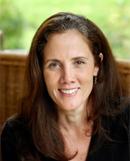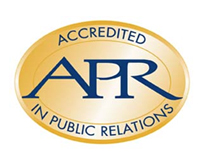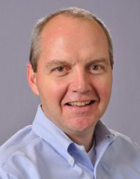PR Society of America has retained the Organizational Performance Group, Hamden, Conn., to do research on its accreditation program and offer advice on how to improve it.
OPG is headed by Laura Freebairn-Smith, who has an MBA from the Yale School of Management and a doctorate in Organizational Systems from Saybrook Institute, California. Her BA was obtained from UC Berkeley in philosophy and political science.
 Freebairn-Smith |
Her bio says she "helps leaders realize the full potential of their organizations through humanistic and analytical practices."
PR Society chair Mickey Nall, in announcing the appointment, noted that APR will be 50 years old next year and "We believe the time is right to work with the Universal Accreditation Board to explore the APR's potential and identify possible avenues for improvement."
Seven other organizations comprise the UAB. A majority of the seats on the board are held by PRSA members.
APR Will Not Be Abandoned
"Abandoning APR is not an option," said Nall.
OPG, he said, will talk to volunteer and staff leaders and be involved in data analysis, surveys, interviews, focus groups, benchmarking and meta-analysis and will "explore different stakeholder perceptions on the strengths and weaknesses of APR, pros and cons of maintaining the APR, desired services for APR holders, suggestions for improvements and strategies for supporting APR and marketing it to members and employers."
No budget was given.
Nall noted that APRs awarded by the UAB fell from an average of 256 a year from 1993-2002 to an average of 157 a year between 2003-2012. APRs were 25.47% of members in 1994 and 18.43% now. A new multiple-choice test replaced the previous test which required 4.5 hours of writing.
The Assembly, which has the sole power to keep APR as a requirement for national office, is about 70% APR.
 Veteran APR holders fear that dropping APR requirement for office would be fatal to the program.
Veteran APR holders fear that dropping APR requirement for office would be fatal to the program.
IABC Program in Suspension
The International Assn. of Business Communicators suspended its Accredited Business Communicator program last fall because of declining interest.
IABC retained consultant Michael Hamm of Albuquerque who advised a new two-tier “certification” program that would employ computer testing and require renewal every three years. Those with eight years of experience would be CCPs (Certified Communication Professional) and those with 15 years would be CSCPs (Certified Strategic Communications Professional).
ABC members protested such a change and also the firing of 16 of the 32 staffers on Nov. 30, by new executive director Christopher Sorek. More than 300 e-mails were posted on a LinkedIn website about the changes. Sorek announced his resignation earlier this month.
Page Has “High-Level” Program
 Sheffer |
The Arthur W. Page Society, about 400 senior PR practitioners most from blue chip companies, unveiled plans April 4 for a skills-building program for "senior communicators" whose initial cost would be $3,750 per participant ($3,500 for early applicants). Annual dues would be $2,500.
Page members would be able to nominate up to three senior staff members. Preference would be given to senior practitioners with more than 15 years in PR.
Nominees should be "corporate communications experts and may have demonstrated thought leadership," says literature on the program.
Gary Sheffer, VP-communications, General Electric, and Thomas Martin, College of Charleston, are co-chairs.
PR people say Page is no doubt dissatisfied with the skills development programs of the PR Society and IABC.
PRS and other PR groups make liberal use of the words "profession" and "professionalism" (PRSA's slogan is to "advance the profession and the professional") but PR Prof. Michael Parkinson, who is also a lawyer, has argued that PRhas none of the trappings of the established professions such as law and medicine which are state-licensed and have procedures for removing errant practitioners.The PR Society dropped enforcement of its Ethics Code in 2001 although a survey of members taken by the Ethics Resource Center showed most members favored an enforceable Code. PRS paid $50,554 for research by ERC but ignored its recommendation that enforcement be kept.


 This is an open letter to
This is an open letter to  A PR practitioner who puts "APR" after his or her name is apt to remind clients of "Annual Percentage Rate" and is flying in the face of advice that use of such "post-nominal letters" is counter-productive.
A PR practitioner who puts "APR" after his or her name is apt to remind clients of "Annual Percentage Rate" and is flying in the face of advice that use of such "post-nominal letters" is counter-productive.


 Have a comment? Send it to
Have a comment? Send it to 
No comments have been submitted for this story yet.